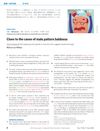 24 citations,
August 2017 in “Prostaglandins & Other Lipid Mediators”
24 citations,
August 2017 in “Prostaglandins & Other Lipid Mediators” CRTH2 antagonists might be useful for treating many conditions because they play a role in immune and inflammation responses.
 January 2013 in “Hair transplant forum international”
January 2013 in “Hair transplant forum international” Minoxidil and finasteride are effective for male hair loss; minoxidil also helps female hair loss, with some treatments needing more research.
3 citations,
January 2016 in “Case reports in dermatological medicine” An 80-year-old man grew extra hair on his forearms after starting Alzheimer's medication rivastigmine.
 December 2022 in “Rossijskij žurnal kožnyh i veneričeskih boleznej”
December 2022 in “Rossijskij žurnal kožnyh i veneričeskih boleznej” New treatments for child hair loss due to immune issues are effective but not yet officially approved.
 October 2024 in “Annals of Allergy Asthma & Immunology”
October 2024 in “Annals of Allergy Asthma & Immunology” Anaphylaxis from cow's milk allergy can cause temporary hair loss in children.
 2 citations,
August 2017 in “British Journal of Dermatology”
2 citations,
August 2017 in “British Journal of Dermatology” Hair loss in Cronkhite-Canada syndrome may be due to an autoimmune response.
 July 2024 in “Journal of Cosmetic Dermatology”
July 2024 in “Journal of Cosmetic Dermatology” Rose stem cell exosomes can significantly improve hair growth in androgenetic alopecia.
1 citations,
January 2023 in “IntechOpen eBooks” Paclitaxel is an effective cancer drug with side effects and potential new uses beyond cancer.
110 citations,
December 2013 in “The journal of investigative dermatology. Symposium proceedings/The Journal of investigative dermatology symposium proceedings” Alopecia areata is a genetic and immune-related hair loss condition that is often associated with other autoimmune diseases and does not typically cause permanent damage to hair follicles.
 April 2018 in “Journal of Investigative Dermatology”
April 2018 in “Journal of Investigative Dermatology” DPP4 is important for scarring and skin regeneration, and managing its activity could improve skin healing treatments.
 17 citations,
April 2002 in “Contact Dermatitis”
17 citations,
April 2002 in “Contact Dermatitis” Minoxidil 5% caused skin discoloration in a man using it for hair loss.
 114 citations,
March 2002 in “Current opinion in oncology/Current opinion in oncology, with cancerlit”
114 citations,
March 2002 in “Current opinion in oncology/Current opinion in oncology, with cancerlit” Cancer therapy can cause various skin problems, including hair loss, skin darkening, painful hand-foot syndrome, and severe skin damage.
 November 2011 in “Australasian Journal of Dermatology”
November 2011 in “Australasian Journal of Dermatology” Cellulite may be linked to low adiponectin, isotretinoin with UVB can treat psoriasis effectively, permanent alopecia post-chemotherapy resembles a unique hair loss, deodorants may cause fragrance allergies, desmoplastic melanoma is becoming more common, and intensive UVB treatment can give long-term psoriasis remission.
 34 citations,
September 1985 in “Contact Dermatitis”
34 citations,
September 1985 in “Contact Dermatitis” Minoxidil can cause skin irritation like eczema and rash in some users.
 April 2018 in “The journal of investigative dermatology/Journal of investigative dermatology”
April 2018 in “The journal of investigative dermatology/Journal of investigative dermatology” Androgens increase growth factors in skin cells, which may lead to acne.
 April 2018 in “Journal of Investigative Dermatology”
April 2018 in “Journal of Investigative Dermatology” The study found that p63 needs signals from morphogens to help skin cells differentiate properly.
2 citations,
July 2019 in “Indian dermatology online journal” A 17-year-old girl and her brothers have a rare hair condition with long eyelashes, thick eyebrows, and easily pluckable hair.
73 citations,
October 1986 in “Journal of the American Academy of Dermatology” Tretinoin may help hair growth and works better when combined with minoxidil.
 June 2012 in “Nature digest”
June 2012 in “Nature digest” A substance called prostaglandin D2 is linked to stopping hair growth in men with common baldness.
 14 citations,
June 1952 in “The BMJ”
14 citations,
June 1952 in “The BMJ” Phenobarbitone can cause severe and sometimes fatal skin reactions.
 118 citations,
July 2005 in “Journal of Ethnopharmacology”
118 citations,
July 2005 in “Journal of Ethnopharmacology” Eclipta alba extract improved learning, memory, and stress-related ulcers in rats without affecting movement or causing anxiety.
October 2017 in “Planta medica international open” Public education should promote the careful use of Turkish medicinal plants for skin diseases.
 26 citations,
August 2006 in “Journal of Clinical Pharmacy and Therapeutics”
26 citations,
August 2006 in “Journal of Clinical Pharmacy and Therapeutics” Some patients lost hair after being treated with the drug enoxaparin for a brain vein clot.
 12 citations,
August 2017 in “Archives of Pharmacal Research”
12 citations,
August 2017 in “Archives of Pharmacal Research” Lecithin-based microparticles can deliver minoxidil for hair growth effectively with less skin irritation.
 6 citations,
August 2017 in “Physiological Research”
6 citations,
August 2017 in “Physiological Research” Setipiprant may reduce inflammation by blocking an enzyme called aldose reductase.
 12 citations,
February 2014 in “Recent Patents on Inflammation & Allergy Drug Discovery”
12 citations,
February 2014 in “Recent Patents on Inflammation & Allergy Drug Discovery” Shampoos have evolved into multifunctional products with patented innovations for different hair needs and can include medicinal herbs for hair and scalp health.
 April 2024 in “Public health”
April 2024 in “Public health” Vaccination and timely treatment reduce the risk of long COVID.
 November 2023 in “Journal of Cosmetic Dermatology”
November 2023 in “Journal of Cosmetic Dermatology” Oral minoxidil is more convenient but topical minoxidil improves hair density better.

Marking Nut extract in coconut oil may be an effective natural alternative for treating dandruff and promoting hair growth.
1 citations,
December 2022 in “Pathogens” A stray cat with severe scabies recovered after 4 weeks of treatment.























